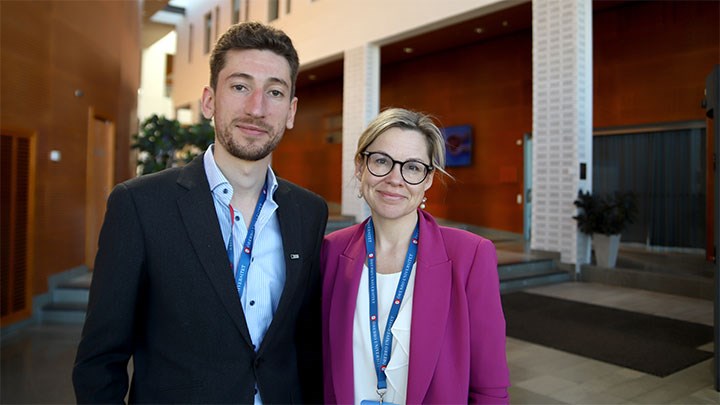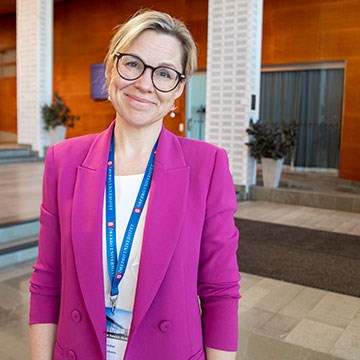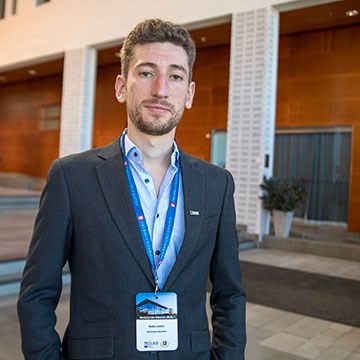“We must foster international collaboration and broaden our perspectives through scientific mobility”

Matteo Gentile (Bielefeld University) and Karin Blad (Örebro University) were part of the 1st Summer Conference of the NEOLAiA Law Network in Örebro.
The 1st Summer Conference of the NEOLAiA Law Network demonstrates how the network enriches the work of legal scholars across Europe with an international perspective.
“International cooperation enables me to tackle transnational legal challenges more effectively by pooling diverse expertise”, says Matteo Gentile, researcher from Bielefeld University who travelled to Örebro to participate and present at the conference.
The NEOLAiA Law Network (NLN) was founded with the aim of providing a platform for cooperation between legal scholars from the NEOLAiA partner universities. The NLN not only enables legal scholars to collaborate across Europe, but also gives them an international perspective on their own work.
The 1st Summer Conference of the NEOLAiA Law Network in Örebro was an important step in this direction. Over 50 law researchers of the NLN from the universities in Örebro, Salerno, Jaén, Suceava, Bielefeld, Tours, Nicosia and Reykjavik came together to spend two days discussing their research perspectives on common constitutional traditions of the EU and new teaching and learning methods in law with AI. It was the first time that the international members of the NLN met in person.
Great opportunity for academic exchange
A great success, says legal researcher Karin Blad from Örebro University:
“Hearing other researchers’ perspectives on national but also on our common EU law is always useful. We need to promote international co-operation and broaden our perspectives through scientific mobility. And when collaborating, it’s always more productive to meet in person. This is why we have organised this conference."

The conference marks the start of a more intense phase for the network and the linking of individual research projects.
Karin Blad is a senior lecturer at the Department of Behavioural, Social and Legal Sciences at Örebro University and researches corporate law and solvency law. She was a part of the conference organising committee and is convinced that the NEOLAiA Law Network is a great opportunity for academic exchange. She says:
“It's always good to meet researchers from other countries because many of the legal provisions we all have are affected by European Union legislation. This provides a good starting point for talking about differences and similarities between our national laws. The EU therefore connects us as international researchers beyond national borders."
Karin Blad explains that within the NLN early-stage researchers are especially important. The aim is to encourage them to network internationally at the start of their careers.
Connecting universities with strong regional focus
Matteo Gentile is one of these early-career researchers whose work is enriched by the NLN. He is a legal scholar and a PhD candidate at Bielefeld University:
“I write my thesis about environmental law, which, although based on German law, is deeply influenced by European Union legislation. EU laws set the foundation that member states, including Germany, have adapted. This shows how internationalisation directly shapes my research.”

Matteo Gentile travelled to Örebro to be part of the NLN conference as a participant and also as a speaker. He says:
“International cooperation enables me to tackle transnational legal challenges more effectively by pooling diverse expertise”.
Besides his presentation about constitutional mechanisms in Italy and Germany and his participation in a debate about AI in the context of academic education, he held a lecture about German environmental law, but also on the reutilisation of mining areas. This shows, how legal topics arouse interest across national borders.
Matteo Gentile is convinced that NEOLAiA provides universities with a productive international network:
“The NEOLAiA platform connects regional research to a broader European context, enhancing its impact. We are not Berlin, we are Bielefeld. It’s Örebro, not Stockholm. While its partner universities, like Bielefeld and Örebro, each have a strong regional focus, NEOLAiA helps them transcend these local perspectives. This collaboration fosters the exchange of knowledge across diverse regions, strengthening their collective influence.”
In the future, he hopes that networks such as those created by the conference will be further strengthened:
“I strongly support the idea of holding the conference regularly in different countries to ensure broad participation. This network fosters cross-border relationships, encouraging diverse perspectives that enrich legal research. Such exchanges with researchers from all over Europe can lead to breakthroughs and deeper reflection on our own work.”
Why is the international cooperation through the NLN important for you?
Research thrives on collaboration and collegial exchange. By bringing together scholars I might never meet, the NLN turns solitary questions into comparative conversations that deepen legal understanding. Every encounter sharpens ideas, forges alliances, and turns insight into action.
Karin Blad, researcher at Örebro University
The NEOLAiA Law Network allows me to make contacts to other researchers that might help me in my further career. It gives me a great possibility to exchange with lawyers from different countries and different scientific backgrounds and therefore, different perspectives. Presenting my research in an environment like this is challenging - especially because it is in different language that my usual research - but it sharpens my understanding of my own work.
Matteo Gentile, researcher at Bielefeld University
NEOLAiA (from the Greek word for youth) is an alliance of nine young European universities with robust rankings and strong regional presence.
The 1st Summer Conference of the NEOLAiA Law Network took place from 19 to 20 May at Örebro University. The annual conference will be hosted by a different NEOLAiA partner university each year.
The network plans a joint publication on the topics discussed after each conference in order to secure the output for the research community in the long term.
Text: Julia Baumann
Photo: Julia Baumann
Translation: Charlotta Hambre-Knight
